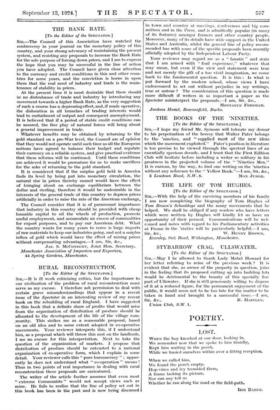THE BANK RATE.
[To the Editor of the SPECTATOR.] SIR,—The Council of this Association have watched the controversy in your journal on the monetary policy of this Dountry, and your strong advocacy of maintaining the present
system, and resisting any proposals to increase the Bank Rate for the sole purpose of forcing down prices, and I am to express the hope that you may be successful in the line of action you have adopted. The Council have given close attention to the currency and credit conditions in this and other coun- tries for some years, and the conviction is borne in upcin them that the real need of industry and trade is the main- tenance of stability in prices.
At the present time it is most desirable that there should be no distrubance of trade and industry by introducing any movement towards a higher Bank Rate, as the very suggestion of such a course has a depressing effect, and, if made operative, the dislocation in all branches of trading interests would lead to curtailment of output and consequent unemployment. It is believed that if a period of stable credit conditions can be assured, the free play of natural forces will bring about a general improvement in trade.
Whatever benefits may be obtained by returning to the gold standard on a pre-War level, the Council are of opinion that they would not operate until such time as all the European nations have agreed to balance their budget and regulate their currency on a reliable system, and give practical evidence that these reforms will be continued. Until these conditions are achieved it would be premature for us to make sacrifices for the sake of returning to the gold standard.
It is considered that if the surplus gold held in America finds its level by being put into monetary circulation, the natural rise in prices thereby caused would have the effect of bringing about an exchange equilibrium between the dollar and sterling, therefore it would be undesirable in the interests of the general trade of this country to depress prices artificially in order to raise the rate of the American exchange.
The Council consider that it is of paramount importance that industry in this country should be provided with cheap loanable capital to oil the wheels of production, promote useful employment, and accumulate an excess of commodities for export purposes, and to pay our American debt. What the country wants for many years to come is large imports of raw materials to keep our industries going, and not a surplus influx of gold which would have the effect of raising prices without compensating advantages.—I am, Sir, &c.,
JAS. S. MCCONECHY, Joint Hon. Secretary. Manchester Association of Importers and Exporters, 44 Spring Gardens, Manchester.


































 Previous page
Previous page